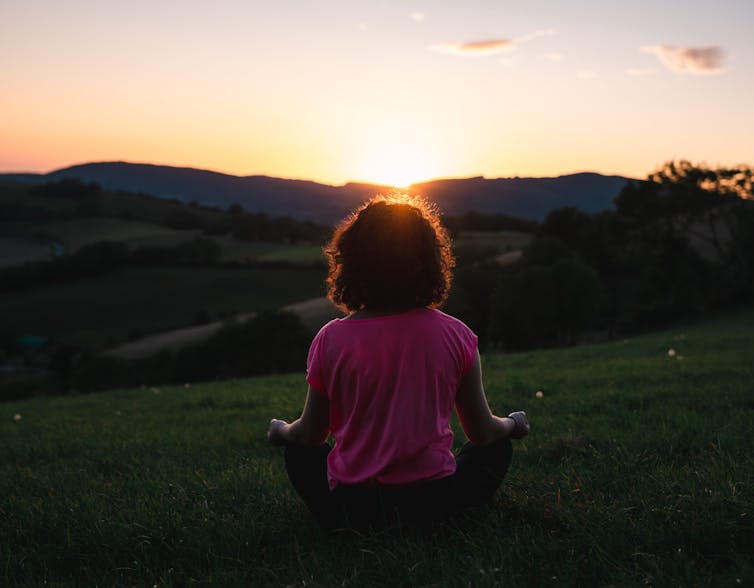As people in the U.S. mark six months of coronavirus, the challenges of coping with life during a pandemic continue to evolve. Most recently, reopening of parts of society under unsettled conditions and lingering threat are creating formidable demands on individuals and communities.

Léonard Cotte/Unsplash, CC BY
By looking at how people have reacted to mass traumas in the past – think the terrorist attacks of 9/11 or the aftermath of Hurricane Katrina – psychology researchers like us can learn about which coping strategies have historically been effective. For instance, people were able to boost their self-esteem and curtail negative thinking in the wake of 9/11 if they engaged in activities that fit their personal values, goals and responsibilities. They could find meaning in what they did, interpreting their actions in a positive manner.
So while traumas like these kinds of events can lead to anxiety and depression, they can also pave the way for resilience and recovery. As the coronavirus pandemic situation and stresses change, so do our recommendations for what coping strategies might be most helpful.
Mental health challenges change over time
The particulars of this pandemic make it challenging to appraise risk. Unless you’ve lost an acquaintance, friend or, most tragically, a family member, the escalating numbers of people stricken by COVID-19 can feel like mere statistics, detached from the reality of the moment. For many people, the coronavirus lurks “out there.” How close or imminent the danger it poses is far from certain.
Individuals’ perceptions of risk are ensnared in a tangle of politics and information from competing sources. It’s hard to settle on a shared social narrative regarding what is fact or fiction, or overreaction or underreaction. And all of this is unwinding in a divided country roiled by protests and racial tension.
Unlike a natural disaster such as a hurricane, tornado, earthquake or a terrorist attack, the pandemic drags on and does not have a clear-cut endpoint. The end of the COVID-19 crisis feels remote, as promised treatments or vaccines will not be available for months, at least.
Opening up, together with a pandemic with no expiration date, creates ambivalence and insecurity. The promise of a return to normalcy is accompanied by legitimate ongoing concerns about health and safety.
These aspects of the COVID-19 crisis call for the flexible use of coping strategies to adapt to changing circumstances. Research-informed techniques that were valuable in the early days of the pandemic, when people were primarily worried about staying healthy during mandated lockdown, are still relevant today – such as engaging in value-driven activities, accepting negative experiences nonjudgmentally and moving forward in life, and marshalling social support. But they’re not necessarily sufficient for grappling with the fluid circumstances and challenges created by the reopening of society.
Ways to cultivate resilience in yourself
Three strategies – cognitive reappraisal, problem-focused coping and cultivating compassion and lovingkindness – seem particularly well suited to the shifting realities of the pandemic.
Cognitive reappraisal involves reframing the way one interprets an emotional or stressful event or situation to regulate or neutralize its harmful impact. You can think about working from home, for example, as an opportunity to spend more time with family, engage in hobbies or get caught up on projects, rather than as a threat to job security.
This strategy tempers the kind of all-or-nothing thinking – such as “the world is unsafe,” “I cannot do anything to help” and “our leaders know nothing” – that can take people down a road of anxiety, worry and mistrust of others. Instead, reappraisal helps you move toward healthy perspectives on stressful situations, dampens negative emotions and boosts positive emotions and keenness to participate fully in life.
Problem-focused coping can be another helpful strategy. It frames a stressful situation as a problem to be solved and fuels planning and the search for practical solutions. For example, people who know they feel worried or depressed after consuming news can plan to monitor and control the timing (such as not before sleep), nature and amount of news they consume.
Effective problem-solving increases positive emotions, self-confidence and motivation. It also lessens the psychological impact of stressors.
As society opens up, you need to weigh the pros and cons of shopping, eating in restaurants, or seeking medical treatment, informed by the best available evidence. Problem-focused coping can help you make decisions about whether an activity is safe and consistent with your personal values and the needs of others.
Finally, a practice called lovingkindness meditation can help you get through trying times. It involves contemplating and generating positive feelings and tolerance towards yourself and others. Combining lovingkindness meditation with empathy for those with different political views, for example, can help heal frayed bonds of friendship when social support is most needed. Pausing each day to embrace love and kindness counteracts self-blame, guilt, feelings of alienation and social isolation.
Human beings are astonishingly resilient and have prevailed over mass traumas and tragedies before – the COVID-19 pandemic will be no exception. People have proved again and again that it’s possible to forge on and even thrive during periods of turmoil and transition. These coping strategies can help make sure you come out the other side of this pandemic with a good psychological outlook.![]()
Craig Polizzi, Binghamton University, State University of New York and Steven Jay Lynn, Binghamton University, State University of New York
Craig Polizzi, PhD Student in Clinical Psychology, Binghamton University, State University of New York and Steven Jay Lynn, Distinguished Professor of Psychology, Binghamton University, State University of New York
This article is republished from The Conversation under a Creative Commons license. Read the original article. https://creativecommons.org/licenses/by-nd/4.0/
